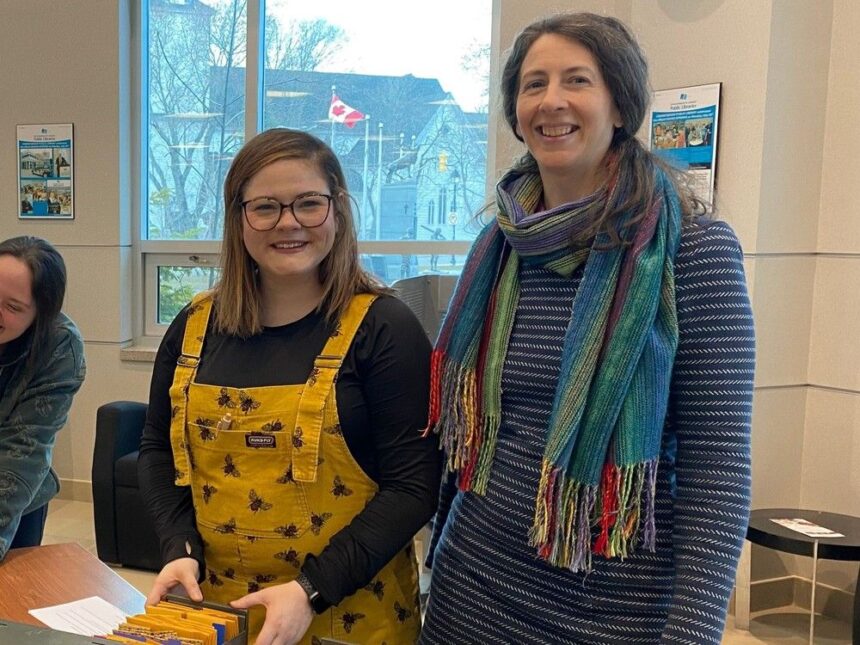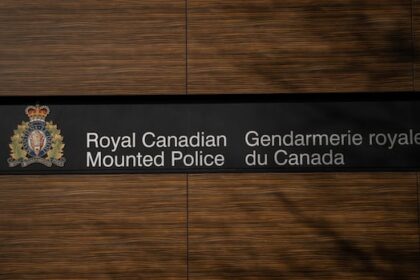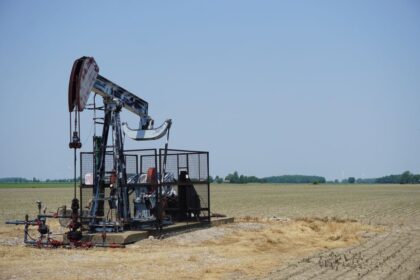The project aims to make it easier for people to create home gardens in western NL and emphasizes the importance of seed security, diversityPublished Apr 26, 2025 • 5 minute readBrittany Noseworthy, left, librarian at the Corner Brook Public Library, and Katie Temple, executive director of the Western Environment Centre, worked together to launch the city’s first seed library. CONTRIBUTEDThe Western Environment Centre (WEC) and the Corner Brook Public Library have joined forces on a growing initiative to launch the city’s first seed library.What is a seed library?Just as the name suggests, a seed library is somewhere that people can go to get seeds, for free, to grow in their gardens.Katie Temple, executive director of the Western Environment Centre, told The Telegram that starting the seed library was something that she and librarian Brittany Noseworthy first talked about two years ago.THIS CONTENT IS RESERVED FOR SUBSCRIBERS ONLY.Subscribe now to access this story and more:Unlimited access to the website and appExclusive access to premium content, newsletters and podcastsFull access to the e-Edition app, an electronic replica of the print edition that you can share, download and comment onEnjoy insights and behind-the-scenes analysis from our award-winning journalistsSupport local journalists and the next generation of journalistsSUBSCRIBE TO UNLOCK MORE ARTICLES.Subscribe or sign in to your account to continue your reading experience.Unlimited access to the website and appExclusive access to premium content, newsletters and podcastsFull access to the e-Edition app, an electronic replica of the print edition that you can share, download and comment onEnjoy insights and behind-the-scenes analysis from our award-winning journalistsSupport local journalists and the next generation of journalistsRegister to unlock more articles.Create an account or sign in to continue your reading experience.Access additional stories every monthShare your thoughts and join the conversation in our commenting communityGet email updates from your favourite authorsSign In or Create an AccountorArticle content“We both thought it would be a great initiative,” said Temple.But with other projects on the go, it just wasn’t feasible at the time.About six months ago, the two started talking again and felt it was something that they could now undertake.“So, we started to explore what would be involved in starting a seed library and we realized we could pull it together in a pretty straightforward way, pretty simple,” said Temple.A few meetings later, the seed library was ready for its official launch on Earth Day, April 22.Temple said that it was well timed, “because everyone is starting to think about seeds and gardening and growing this time of year,” and the launch had a strong turnout.Why is a seed library important?Temple said it’s a good fit with WEC’s other programs, including its community gardens and composting program.Article content“We really wanted to make seeds and gardening generally more accessible to the community,” she said.“We’re creating these community food programs that are very hands-on and that reduce the barriers to people growing their own food.”She said it’s important to distribute really high-quality seeds for free and highlight the important role seeds play in “localizing our food system and in making it more resilient.”“It’s not just about growing our own food here at home and in the province, but also sourcing our seeds as locally as possible, and sometimes I think that gets left out of the conversation,” she said.“Seed diversity has decreased over time, and if we’re able to preserve locally adaptive seeds, then of course that’s going to make our own system more resilient and a lot more adaptable. The more different kinds of plants that we have then the more that our food system, and our ecosystems, and us, as our communities, the more we can adapt and overcome any challenges that come our way.”Article contentThe Western Environment Centre is providing the seeds and information about the seeds through the program. As much as possible, WEC is providing seeds from Atlantic Canadian sources. It’s part of their attempts to emphasize seed security and seed diversity as important issues.“We’re giving away free seeds to the community, helping people to access the ability to garden in an easier way, while at the same time letting people know how important it is to pay attention to seeds.” There’s a wide variety of seeds available for free at the Corner Brook Public Library’s new seed library. CONTRIBUTEDThe seed choice helps with that, she said.“We’re really highlighting the importance of regionally adaptive varieties, of heirloom seeds, of organic seeds. So, we’re really making sure we’re sourcing high-quality seeds and ones that will hopefully do better in our climate and in our conditions.”Article contentThe library is taking care of the distribution. The fact that’s called a seed library, Temple said, makes the library the right fit.“Public libraries are such amazing community resources. We think of them sometimes just as providing books, but they do so much around community engagement, and providing a place for people to meet, for the community to come together in a really accessible and free way,” she said, calling it an ideal spot for distribution.“Anybody can go there. They can go for free. You can get a library card for free. You can access other resources while you’re there,” she saidHow does it work?Anyone can go and browse the seed catalogue at the library.To pick up some seeds, people will need a valid library card and can take up to 10 packs of seeds per year.Article content“That’s what we’re starting out with for the pilot because we’re gauging the interest in the program, and so that could change over time,” she said, adding it will also depend on how many seeds they have each year.There’s a variety available, including peas and beans, tomatoes, kale, lettuce, squashes, pumpkins and cucumbers and more.Some are considered heritage or heirloom and are produced as close to home as possible.Temple said these will grow better in our conditions and are important to the biodiversity of the food that we are growing.How will the program grow?While WEC is providing the seeds for now, the plan is to also welcome seed donations.“We’re hoping that, over time, we can get more and more donations of seeds from people in the community,” she said.Article contentIdeally, these will be seeds people save when they harvest their vegetables in the fall and then donate to the seed library.Donations of extra seeds that people have left over from what they have bought will also be accepted.“A lot of times, you end up as a gardener with a lot more seeds than you can actually use in a year. A lot of the seed packs have quite a few seeds in them,” said Temple.Donated seeds can’t be older than one year and must be well labelled and clean.Guidelines for donating can be found on WEC’s website and donations will be accepted at the library.Temple said WEC will likely offer some workshops on seed saving and planning your garden so you can have some seeds to save over the next few months. The seed library at the A.C. Hunter Public Library in St. John’s opened for the 2025 season in March. FACEBOOKAre there other seed libraries or exchanges in NL?Article contentThe A.C. Hunter Public Library on Allendale Road in St. John’s opened its seed library for the 2025 season in late March, an initiative that started 10 years ago.Library patrons can bring their library card to the third floor of the library and choose up to five packets of seeds to take home.Read More New downtown Corner Brook greenhouse aims to keep conversation about food sustainability ‘out in the open’ Corner Brook woman enjoying watching her garden grow Seeds of Diversity is a national organization that provides support for projects like the seed library.People can sign up for free and join its seed exchange program.Seeds of Diversity also provided WEC with some seeds for its seed library.Article content
Want to start a garden? A new seed program launched at Corner Brook library can help











